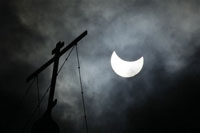Beijing Olympics to become worst Games in history because of Russian total solar eclipse
The disappearance of the solar disc during the daytime has been considered an omen of tragedies and catastrophes from times immemorial. Nowadays, many people still believe that unusual natural phenomena many govern human life.

The so-called Russian total solar eclipse was seen best in Russia’s Siberia on August 1. Muscovites could only observe a partial eclipse.
Astrologist Sergei Popov believes that the solar eclipse will lead to negative consequences only. The astrologist said that the phenomenon would affect outstanding, charismatic personas and leaders first and foremost. Popov is certain that solar special effects will result in serious changes for the Russian Orthodox Church. “These will be negative and even tragic changes,” the astrologist said.
According to Sergei Popov, the total solar eclipse will affect the forthcoming Beijing Olympics. The games will start on August 8, between two eclipses (the lunar eclipse will take place on August 17).
“It will be the most intense, unpredictable and complicated sports event in the history of the Olympic movement. We have many scandals in store for us, but one should not expect any outstanding achievements from Russian athletes, the specialist said.
“The moon’s shadow on the sun will trigger political changes and high-profile criminal cases in Russia,” the astrologist said.
Another astrologist, Svetlana Anenskaya, believes that the total solar eclipse marks the end of the era of tyranny. “The eclipse will contribute to the removal of living and dead monsters of old ideology that enslaved people’s minds,” she said.
Astrofuturologist Nikolai Pantelemonov believes that the people, who come into the world on the eclipse day, may become very good leaders in the future.
Total solar eclipses are rare events. Although they occur somewhere on Earth every 18 months on average, it has been estimated that they recur at any given place only once every 370 years, on average. The total eclipse only lasts for a few minutes at that location, as the Moon's umbra moves eastward at over 1700 km/h. Totality can never last more than 7 min 31 s, and is usually much shorter: during each millennium there are typically fewer than 10 total solar eclipses exceeding 7 minutes.
The last time this happened was June 30, 1973 (7 min 3 sec). Observers aboard a Concorde aircraft were able to stretch totality to about 74 minutes by flying along the path of the Moon's umbra. The next eclipse exceeding seven minutes in duration will not occur until June 25, 2150. The longest total solar eclipse during the 8,000-year period from 3000 BC to 5000 AD will occur on July 16, 2186, when totality will last 7 min 29 s. For comparison, the longest eclipse of the 21st century will occur on July 22, 2009 and last 6 min 39 sec.
Subscribe to Pravda.Ru Telegram channel, Facebook, RSS!





